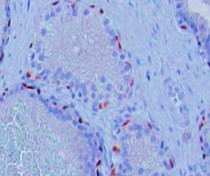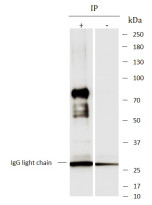ARG44755
anti-p63 antibody
anti-p63 antibody for IHC-Formalin-fixed paraffin-embedded sections,Immunoprecipitation,Western blot and Human
Overview
| Product Description | Mouse Monoclonal antibody recognizes p63 |
|---|---|
| Tested Reactivity | Hu |
| Tested Application | IHC-P, IP, WB |
| Host | Mouse |
| Clonality | Monoclonal |
| Isotype | IgG2b |
| Target Name | p63 |
| Antigen Species | Human |
| Conjugation | Un-conjugated |
| Alternate Names | p63; Tumor protein p73-like; B(p51A); AIS; p53CP; p73L; p73H; p40; EEC3; TP63; NBP; Chronic ulcerative stomatitis protein; TP53CP; CUSP; B(p51B); TP73L; p51; Transformation-related protein 63; Keratinocyte transcription factor KET; SHFM4; TP53L; RHS; LMS; Tumor protein 63; OFC8; KET |
Application Instructions
| Application Suggestion |
|
||||||||
|---|---|---|---|---|---|---|---|---|---|
| Application Note | * The dilutions indicate recommended starting dilutions and the optimal dilutions or concentrations should be determined by the scientist. |
Properties
| Form | Liquid |
|---|---|
| Purification | Protein A purification |
| Buffer | PBS with 0.09% sodium azide |
| Storage Instruction | For continuous use, store undiluted antibody at 2-8°C for up to a week. For long-term storage, aliquot and store at -20°C or below. Storage in frost free freezers is not recommended. Avoid repeated freeze/thaw cycles. Suggest spin the vial prior to opening. The antibody solution should be gently mixed before use. |
| Note | For laboratory research only, not for drug, diagnostic or other use. |
Bioinformation
| Database Links | |
|---|---|
| Gene Symbol | TP63 |
| Gene Full Name | tumor protein p63 |
| Background | This gene encodes a member of the p53 family of transcription factors. An animal model, p63 -/- mice, has been useful in defining the role this protein plays in the development and maintenance of stratified epithelial tissues. p63 -/- mice have several developmental defects which include the lack of limbs and other tissues, such as teeth and mammary glands, which develop as a result of interactions between mesenchyme and epithelium. Mutations in this gene are associated with ectodermal dysplasia, and cleft lip/palate syndrome 3 (EEC3); split-hand/foot malformation 4 (SHFM4); ankyloblepharon-ectodermal defects-cleft lip/palate; ADULT syndrome (acro-dermato-ungual-lacrimal-tooth); limb-mammary syndrome; Rap-Hodgkin syndrome (RHS); and orofacial cleft 8. Both alternative splicing and the use of alternative promoters results in multiple transcript variants encoding different proteins. Many transcripts encoding different proteins have been reported but the biological validity and the full-length nature of these variants have not been determined. [provided by RefSeq, Jul 2008] |
| Function | May be involved in the generation of reactive oxygen species (ROS). Has low NADPH-dependent beta-naphthoquinone reductase activity, with a preference for 1,2-beta-naphthoquinone over 1,4-beta-naphthoquinone. Has low NADPH-dependent diamine reductase activity (in vitro). [UniProt] |
| PTM | May be sumoylated. Ubiquitinated. Polyubiquitination involves WWP1 and leads to proteasomal degradation of this protein. |
Images (3) Click the Picture to Zoom In
-
ARG44755 anti-p63 antibody IHC-P image
Immunohistochemistry: Human prostate stained with ARG44755 anti-p63 antibody at 1 µg/mL dilution.
-
ARG44755 anti-p63 antibody WB image
Western blot: A431 stained with ARG44755 anti-p63 antibody at 1 µg/mL dilution.
-
ARG44755 anti-p63 antibody IP image
Immunoprecipitation: A431 lysate immunoprecipitated with 2.5 µg of ARG44755 anti-p63 antibody.








